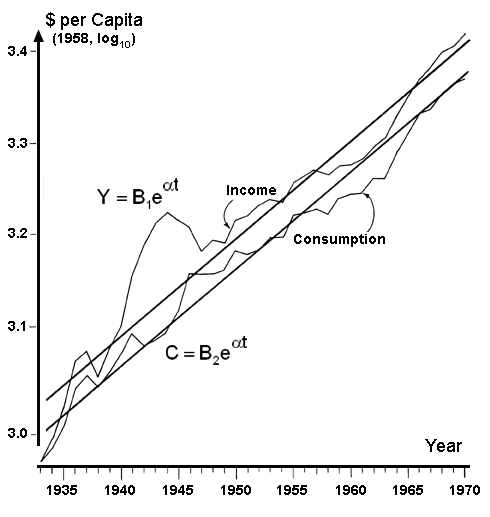Having posited great importance with the inherent frequencies of data series, Roemer proceeded to a novel conclusion for the long out-worn income/consumption discussion. He began by fitting a simple logarithmic function to the long series of income Y and consumption C data used earlier in examining the MPC's constancy. The result is portrayed in the figure below:1

When these series originate at the bottom of the 1929 depression (where income and consumption are nearly equal) the regression equations are calibrated as follows:


The most suggestive observation in these regression parameters would be that both series are governed by the same growth factor, 0.024 per year. This result is strongly indicative of C being a delay on Y: whenever a delay is driven by an exponentially growing function, its outflow will assume an exponential form governed by the same time-constant as the driving function.
To the extent that all the realities of income and consumption might be contained in these two regression equations, the marginal propensity to consume can indeed be computed as a constant with a value just less than unity:

This conclusion references none of Keynes’ fundamental psychological law[s] nor any (yet to be elaborated) detailed facts experience. An MPC with a constant value of 0.92 only presumes that an economic system ...
1. Somehow achieves real exponential growth in income Y; and
2. That consumption C is a delay on income Y, where the parameter governing the delay computes to a typical value of L.
To the extent that such observations persuade, the Keynesian premise, even after having ruled so much economic thinking and political action, should collapse. If economic growth, i.e. the exponential rate of income Y's increase, is to be merely subsumed in economic theory, then what can ever be wrong and in need of theoretical guidance for correction?
Viewed in this way, Keynes’ theory is far from the depression ridden doctrine described
by Schumpeter. Where the MPC is constant at its ordained value, income and consumption are growing at
their long-term average rates, and the interest rate has a healthy value — neither of which is
characteristic of a depression. Thus Keynesian theory is a direct presumption of economic well-being;
one that presumably functions to inform those
still-mysterious deities of economic causation as to our longing for improved economic conditions;
i.e., an instrument of homeopathic magic.
1 Roemer, 1985: p. 28.